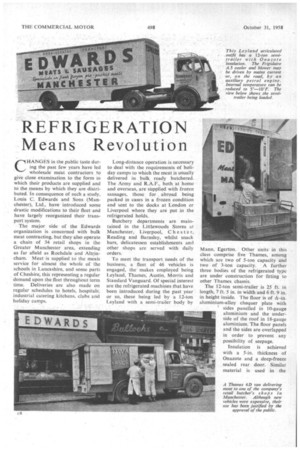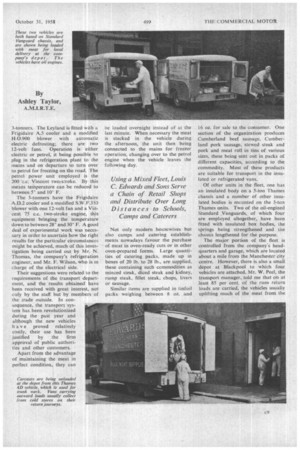REFRIGERATION Means Revolution
Page 44

Page 45

Page 46

If you've noticed an error in this article please click here to report it so we can fix it.
By Ashley Taylor,
A.M.I.R.T.E.
CHANGES in the public taste during the past few years have led wholesale meat contractors to give close examination to the form in which their products are supplied and to the means by which they are distributed. in consequence of such a study, Louis C. Edwards and Sons (Manchester), Ltd., have introduced some drastic modifications to their fleet and have largely reorganized their transport system.
The major side of the Edwards organization is concerned with bulk meat contracting, but they also operate a chain• of 34 retail shops in the Greater Manchester area, extending as far afield as Rochdale and Altrincham. Meat is supplied to the meats service for almost the whole of the schools in Lancashire, and some parts of Cheshire, this representing a regular demand upon the fleet throughout term time. Deliveries are also made on regular schedules to hotels, hospitals, industrial catering kitchens, clubs and holiday camps.
Long-distance operation is necessary to deal with the requirements of holiday camps to which the meat is usually delivered in bulk. ready butchered. The Army and RA.F.," both at home and overseas, are supplied with frozen sausages, those for abroad being packed in cases in a frozen condition and sent to the docks at London or Liverpool where they are put in the refrigerated holds.
Butchery departments are maintained in the Littlewoods Stores at Manchester, Liverpool, Chest e r, Reading and Barnsley, whilst snack bars, delicatessen establishments and other shops are served with daily orders.
To meet the transport needs of the business, a fleet of 46 vehicles is engaged, the makes employed being Leyland, Thames, Austin, Morris and Standard Vanguard. Of special interest are the refrigerated machines that have been introduced during the past year or so, these being led by a 12-ton Leyland with a semi-trailer body by Mann, Egerton. Other units in this class comprise five Thames, among which are two of 5-ton capacity and two of 3-ton capacity. A further three bodies of the refrigerated type are under construction for fitting to other Thames chassis.
The 12-ton semi-trailer is 25 ft. in length, 7 ft. 5 in. in width and 6 ft. 9 in. in height inside. The floor is of A-in. aluminium-alloy chequer plate with ' sides panelled in 10-gauge aluminium and the underside of the roof in 18-gauge aluminium. The floor panels and the sides are overlapped in order to prevent any possibility of seepage.
Insulation is achieved with a 5-in, thickness of Onazote and a deep-freeze sealed rear door. Similar material is used in the 3-tonners. The Leyland is fitted with a Frigidaire A.5 cooler and a modified H.O.900 blower • with automatic electric defrosting; there are two 12-volt fans. OperatiOn is either electric or petrol, it being possible to plug in the refrigeration plant to the mains and on departure to turn over to petrol for freezing on the road. The petrel power unit employed is the 200 c.c. Vincent tworstroke. By this means temperature can be reduced to between 5' and 10' F.
The 3-tonners •have the Frigidaire A.D.2 cooler and a modified S.W.F.350 blower with one 12-volt fan and a Vincent 75 c.c. two-stroke engine, this equipment bringing the temperature down to between 28" and 30° F. A good deal of experimental work was necessary in order to ascertain how the right results for the particular circumstances might be achieved, much of this inves tigation being carried out by Mr. N. Thomas, the company's refrigeration engineer, and Mr. F. Wilson, who is in charge of the electrical side.
Their suggestions were related to the requirements of the transport department, and the results obtained have been received with great interest, not only by the staff but by members of the trade outside. In con sequence, the transport systern has been revolutionized during the past year and although the new vehicles have proved relatively costly," their use has been justified by the firm approval of public authorities and other customers.
Apart from the advantage of maintaining the meat in perfect condition, they can be loaded overnight instead of at the last minute. When necessary the meat is stacked in the vehicle during the afternoon, the unit then being connected to the mains for freezer operation, changing over to the petrol engine when the vehicle leaves the following day.
Not only modern housewives but also camps and catering establishments nowadays favour the purchase of meat in oven-ready cuts or in other oven-prepared forms. Large quantities of catering packs, made up in boxes of 20 lb. to 28 lb., ate supplied, these containing such commodities as minced steak, diced steak and kidney, rump steak, fillet steak, chops, livers or sausage.
Similar items are supplied in tinfoil packs weighing between 8 oz. and 16 oz. for sale to the consumer. One section of the organization produces Cumberland beef sausage, Cumberland pork sausage, stewed steak and pork and meat roll in tins of various sizes, these being sent out in packs of different capacities, according to the commodity. Most of these products are suitable for transport in the insulated or refrigerated vans.
Of other units in the fleet, one has an insulated body on a 5-ton Thames chassis and a number of other insulated bodies is mounted on the 3-ton Thames units. Two of the oil-engined Standard Vanguards, of which four are employed altogether, have been fitted with insulated box bodies, the springs being strengthened and the chassis lengthened for the purpose.
The major portion of the fleet is controlled from the company' S headquarters and garage, which are located about a mile from the Manchester city centre. However, there is also a small depot at Blackpool to which four. vehicles are attached. Mr. W. Peel, the transport manager, told me that on at least 85 per cent, of the runs return loads are carried, the vehicles usualiy uplifting much of the meat from the
cold stores as well as fresh meat from the London Smithfield, LiverpooL or Manchester markets. Typical of the regular routeing is that providing for vehicles performing school deliveries in Liverpool to collect from the Merseyside cold stores_
In the case of the school meals service, where large quantities of one particular cut of meat are demanded daily, the supplies are planned well at advance and thus transport, also, can be scheduled quite a long period ahead. An individual vehicle is allocated to each school district and each will make somewhere between 28 and 40 deliveries in the course of a day.
Three to Eight Drops
The average cafe or hotel will, of course, take considerably larger consignments, and in general terms it may be said that the vans on this work make an average of three to eight drops per journey.
More often than not the outgoing runs are planned a week in advance, but return loads are a different matter and transport of incoming consignments has often to be arranged at as little as 10 minutes notice. In some cases the drivers can be informed before leaving in the morning when and where they are to make return collections, •but frequently it is necessary for them to telephone in to the head office for further instructions.
Hotels are apt to make .varying demands in addition to their regular orders, and many are the times when instructions are put through at 4 p.m., or later, for delivery of meat in town • the same evening,
'Checking Deliveries
In the normal course of events, orders are made up as they come in during the day and are placed ready for delivery by specific vehicles. in the majority of cases where meat is being purchased by shops, and in certain other instances, it is checked in front of the customer's representative, being weighed on the shop's own scales.
There are many facets to a business of this nature, one unusual feature in this case being the supply of Continental meat products----such things as krakauer, salami, frankfurters and liver wurst—to the delicatessen establishments in Manchester. One of the local vehicles is occupied practically exclusively in serving this sphere.
On the long distance side, regular runs are made as far afield as South Wales, Northumberland, Warwickshire and southern Scotland, the actual schedules in these instances c10 being planned to suit the delivery requirements of the buyers. In some cases the vans on long-distance work will start in the evening and travel overnight, the drivers resting during the day and returning later. In others they start out in the morning, making delivery in the late afternoon, resting overnight, and returning the following day.
The transport department have their own self-sufficient records and from these I observed that the total annual mileage had increased during the period June,. 1957 June, 1958, by 36,000. Including those engaged on the large amount of shop-to-shop work, the vehicles average 466 miles per week. The drivers are paid standard rates and a higher-thanaverage level for overtime. lhi addition they receive a monthly bonus if their work is performed in every respect in accordance with the company's approved standards.
During the summer holiday period, the total vehicle requirement then being lower than usual, the opportunity is taken to carry out periodical examinations of the fleet and perform non-urgent maintenance work. Normally, all the fleet maintenance is performed by the Edwards: garage, but at the time of writing various tasks are being put out to the motor trade as the company's own facilities are temporarily reduced in consequence of a rebuilding scheme. The equipment normally available for repairs and overhauls is such that, if necessary, vehicles can be stripped right down to the chassis.
Systematic inspections are performed by the maintenance department under the supervision of Mr_ W. Howson, but where any unit of the fleet is brought in as the result of a driver's defect report, a complete check is usually given at the same time. Replacement engines and other subassemblies are held in stock for fitting as necessary.
Vehicle histories, with all the necessary factual details, are maintained by the transport department, every maintenance task being entered and tyre changes being recorded in detail. Costs are summarizedin respect of each vehicle so that the appropriate charges can ,be debited against the various departments that use the transport facilities.
































































































